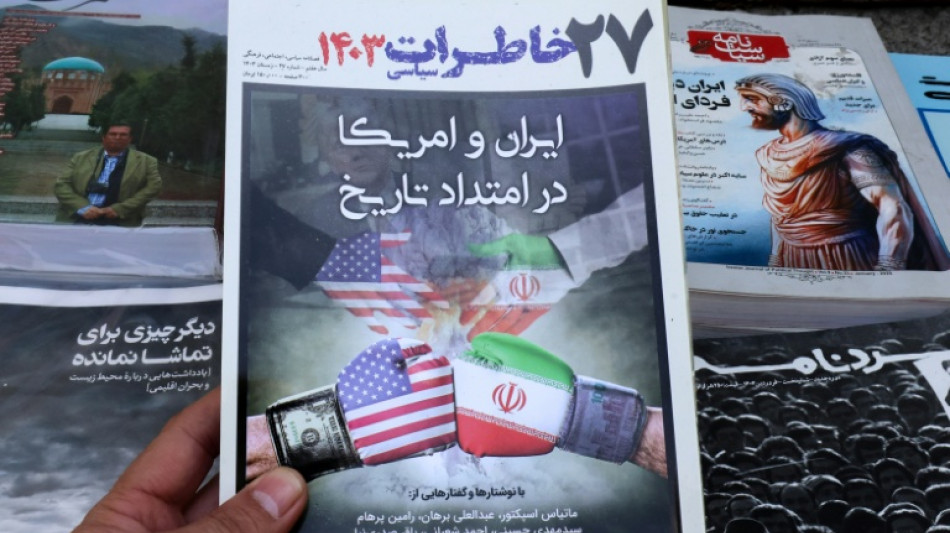

Iran says to hold more nuclear talks with US after latest round
The United States and Iran on Saturday concluded a second round of high-stakes talks on Tehran's nuclear programme, agreeing to meet again in a week's time, the Iranian foreign ministry said.
The Oman-mediated talks in Rome lasted about four hours, according to Iranian state television, which described the atmosphere as "constructive".
"The two sides agreed to resume indirect talks at a technical level over the next few days and subsequently continue at the level of two senior negotiators next Saturday," April 26, Iran's foreign ministry spokesman Esmaeil Baqaei said on X.
Iran later added that the third round of talks would take place in Oman, returning to the site of the initial dialogue a week ago.
Those were the first discussions at such a high level between the foes since US President Donald Trump abandoned a landmark nuclear accord in 2018.
Western countries including the United States have long accused Iran of seeking to acquire nuclear weapons -- an allegation Tehran has consistently denied, insisting that its programme is for peaceful civilian purposes.
Images broadcast by the state TV showed Foreign Minister Abbas Araghchi arriving in the Italian capital, with US Middle East envoy Steve Witkoff also expected to participate.
Araghchi later described the discussions as a "good meeting" that yielded progress.
"This time we managed to reach a better understanding on a series of principles and goals," he told state TV.
He also told the Tasnim news agency that the nuclear issue was the only topic raised.
Baqaei said the delegations had been "in two different rooms" at the Omani ambassador's residence, with Oman's Foreign Minister Badr Albusaidi passing messages between them.
Tehran and Washington have had no diplomatic relations since shortly after Iran's 1979 Islamic revolution.
Following his return to office in January, Trump revived his "maximum pressure" campaign of sanctions against Iran.
In March he sent a letter to Iran's supreme leader Ayatollah Ali Khamenei urging renewed nuclear talks while also warning of military action if diplomacy failed.
"I'm not in a rush" to use the military option, Trump said Thursday. "I think Iran wants to talk."
On Friday, Araghchi said Iran "observed a degree of seriousness" on the US side during the first round but questioned their "intentions and motivations".
In a social media post early Saturday, Baqaei said Tehran was cleareyed about the talks, while "relying also on the past experiences".
The leader of mediator Oman, Sultan Haitham bin Tariq, is due in Moscow in the coming days, according to his office and the Kremlin, which said he would discuss with President Vladimir Putin "current questions on the international and regional agenda" and other issues.
- 'Crucial stage' -
In an interview published on Wednesday by French newspaper Le Monde, the United Nations nuclear watchdog chief Rafael Grossi said Iran was "not far" from possessing a nuclear bomb.
During Trump's first term, Washington withdrew from the 2015 accord between Tehran and world powers that offered Iran relief from international sanctions in return for curbs on its nuclear programme.
Tehran complied with the agreement for a year after Trump's withdrawal before scaling back its compliance.
Araghchi was a negotiator of the 2015 deal. His US counterpart, Witkoff, is a real estate magnate Trump has also tasked with talks on Ukraine.
Iran currently enriches uranium up to 60 percent, far above the 3.67 limit in the deal but still below the 90 percent threshold required for weapons-grade material.
On Friday, US Secretary of State Marco Rubio urged European countries to decide on whether to trigger the "snapback" mechanism under the 2015 agreement, which would automatically reinstate UN sanctions on Iran over its non-compliance.
The option to trigger the mechanism expires in October this year.
Iran has previously warned it could withdraw from the nuclear Non-Proliferation Treaty if the mechanism were triggered.
Grossi, who met Iranian officials in Tehran this week, said the US and Iran were "at a very crucial stage" in the talks and "don't have much time" to secure a deal.
- 'Non-negotiable' -
Iranian officials have insisted that the talks focus only on its nuclear programme and lifting of sanctions.
Araghchi said a deal with the US was "likely" if Washington refrained from "making unreasonable and unrealistic demands", without elaborating.
Analysts had said the United States would push to include discussions over Iran's ballistic missile programme and its support for militants in the Middle East.
Araghchi said Iran's right to enrich uranium was "non-negotiable", after Witkoff called for its complete halt. Witkoff had previously demanded only that Iran return to the ceiling set by the 2015 deal.
On Friday US ally Israel affirmed its commitment to preventing Iran from obtaining nuclear weapons, saying it had a "clear course of action" to prevent this.
I.Frank--MP




